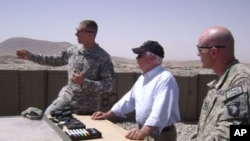U.S. Defense Secretary Robert Gates ended a two-day visit to Afghanistan Friday saying he is encouraged that the strategy the United States adopted last December is working, but warning the outcome is not assured and U.S. troops will likely have a significant combat role for two or three more years. VOA's Al Pessin is traveling with the secretary and filed this report from Combat Outpost Senjaray, in the key southern province of Kandahar.
Secretary Gates trudged through sand, rocks and searing heat at this outpost on the main road between Kandahar and Helmand - in a part of Zhari District that a senior officer described as one of the three toughest areas around Kandahar City. Gates awarded medals to U.S. troops, met some of their Afghan counterparts and talked to soldiers ranging from the most junior to the most senior. In the end, he said he came away "encouraged."
"Everybody knows this is far from a done deal," said Robert Gates. "There is a lot of hard fighting to go. But the confidence of these young men and women that they can be successful gives me confidence."
Gates said the troops know what they have to do and understand the importance of working with Afghan forces, and handing over responsibility to them as soon as possible.
The secretary repeated that the July, 2011 date President Barack Obama has set is only the beginning of what is expected to be a gradual drawdown of U.S. forces here, and he put a rough timeframe on U.S. military involvement.
"We see an inexorable process over the next two or three years in which we will be able to shift our primary role in helping Afghanistan from a military one to training and assistance and development," he said.
Gates said there are already areas where Afghan forces could handle security on their own, but the process of removing U.S. forces will be handled carefully.
Meanwhile, the top U.S. and NATO commander, General David Petraeus, says U.S. special forces troops are intensifying their assault on Taliban leaders, conducting more than 4,000 operations in the last 90 days, in addition to the deployment of surge forces to take control of more neighborhoods in key parts of the country. Secretary Gates said he expects the current approach to be validated by a U.S. government review set for December, its first anniversary.
"The question to be addressed in December is whether the strategy is working, are we heading in the right direction, do we have enough evidence of progress that tells us we are in fact on the right track," said Robert Gates. "That's what our assessment is about. And based on what I've seen here today, I'm hopeful that we will be in that position."
Still, the number two U.S. and NATO operational commander in Afghanistan, General David Rodriguez, told reporters here that while he expects to show progress in the volatile South by December, he can not promise "significant" progress. He said Taliban fighters are using larger roadside bombs made with material smuggled in from Pakistan, including one that destroyed a large, modern American armored vehicle on Monday, killing all five soldiers inside.
Rodriguez says the Taliban is also conducting campaigns of "murder and intimidation" against people in the growing number of areas where U.S. and Afghan troops are taking control. He said although it is difficult to see the end of the Kandahar operation, "the beginning is moving on track."




